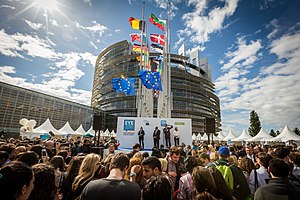
Back قانون الاتحاد الأوروبي Arabic Avropa birliyi hüququ Azerbaijani Право на Европейския съюз Bulgarian Dret comunitari europeu Catalan Právo Evropské unie Czech EU-ret Danish Europarecht German Ευρωπαϊκό Δίκαιο Greek Eŭropunia juro Esperanto Derecho de la Unión Europea Spanish

European Union law is a system of rules operating within the member states of the European Union (EU). Since the founding of the European Coal and Steel Community following World War II, the EU has developed the aim to "promote peace, its values and the well-being of its peoples".[4] The EU has political institutions, social and economic policies, which transcend nation states for the purpose of cooperation and human development.[5] According to its Court of Justice, the EU represents "a new legal order of international law".[6]
The EU's legal foundations are the Treaty on European Union and the Treaty on the Functioning of the European Union, currently unanimously agreed on by the governments of 27 member states. New members may join if they agree to follow the rules of the union, and existing states may leave according to their "own constitutional requirements".[7] Citizens are entitled to participate through the Parliament, and their respective state governments through the Council in shaping the legislation the EU makes. The Commission has the right to propose new laws (the right of initiative), the Council of the European Union represents the elected member-state governments, the Parliament is elected by European citizens, and the Court of Justice is meant to uphold the rule of law and human rights.[8] As the Court of Justice has said, the EU is "not merely an economic union" but is intended to "ensure social progress and seek the constant improvement of the living and working conditions of their peoples".[9]
- ^ "Population on 1 January". ec.europa.eu. Eurostat. Retrieved 12 July 2023.
- ^ Treaty on European Union art 2
- ^ "Living in the EU". European Union. 5 July 2016.
- ^ See TEU art 3(1) 'The Union's aim is to promote peace, its values and the well-being of its peoples.' (3) '... and shall promote social justice and protection...'
- ^ See TEU arts 3(3) 'It shall work for the sustainable development of Europe based on balanced economic growth and price stability, a highly competitive social market economy, aiming at full employment and social progress, and a high level of protection and improvement of the quality of the environment'. Art 4(3) 'Pursuant to the principle of sincere cooperation, the Union and the Member States shall, in full mutual respect, assist each other in carrying out tasks which flow from the Treaties'.
- ^ Van Gend en Loos v Nederlandse Administratie der Belastingen (1963) Case 26/62
- ^ TEU art 50. On the most sophisticated discussion of constitutional law and human rights principles for secession, see Reference Re Secession of Quebec [1998] 2 SCR 217, particularly [67] "The consent of the governed is a value that is basic to our understanding of a free and democratic society. Yet democracy in any real sense of the word cannot exist without the rule of law". And [149] "Democracy, however, means more than simple majority rule".
- ^ See TEU arts 13–19
- ^ Cite error: The named reference
Case 43/75was invoked but never defined (see the help page).
© MMXXIII Rich X Search. We shall prevail. All rights reserved. Rich X Search